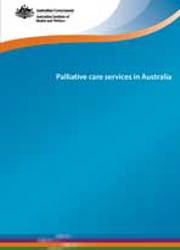Summary
This inaugural report on palliative care services in Australia provides detailed information on the national responses to the palliative care needs of Australians using a range of AIHW and other national data sources. Broadly, it considers three aspects of palliative care; services, resources and patient outcomes.
Services provided
Since 2000-01, the number of palliative care separations reported in public and private hospitals has increased by 51% to almost 56,000 in 2009-10.
Over the 5 years to 2010-11, the number of palliative medicine specialist services subsidised through the MBS more than doubled from 19,554 services in 2006-07 to 42,934.
The number of palliative care-specific prescriptions subsidised as part of the PBS/RPBS decreased in the 5 years to 2010-11, whilst the number of prescriptions for analgesics increased.
About 1 in 1,000 of all general practice encounters reported for the Bettering the Evaluation and Care of Health (BEACH) survey of general practice activity in 2010-11 were palliative care-related encounters.
In 2010-11, there were 11,083 residents in aged care with a completed Aged Care Funding Instrument (ACFI) assessment who were assessed as requiring palliative care.
Resources
Almost $3 million in MBS benefits was paid for palliative medicine specialist services in 2010-11. Over the 5 years to 2010-11 the amount of benefits paid on palliative medicine specialist services subsidised through the MBS has more than doubled.
About $2.5 million in PBS/RPBS benefits was paid for medications included on the palliative care schedule in 2010-11. Over the 5 years to 2010-11 the amount of benefits paid on palliative care schedule items increased four-fold, with an average annual change of about 44%.
There were 172 specialist palliative medicine physicians working in Australia in 2009, representing less than 1 in 100 medical practitioners. There were 5,173 nurses working principally in the area of palliative care nursing in 2009, representing about 1 in 50 employed nurses.
Palliative care outcomes
In 2011 there were a total of 79,253 Palliative Care Outcomes Collaboration (PCOC) phases. Nearly half (43.8%) of all contributing services met the PCOC benchmark 1 (time from referral to contact), where 90% of patients were contacted by a member of the clinical team within 2 days of receipt of referral. Of the 35,389 palliative care episodes in 2011, 81.1% met this benchmark.
More than half (53.3%) of services met benchmark 2.3 (time in unstable phase), where the median length of all unstable phases was 2 days. About 40% of services met benchmark 3.2 (change in pain), where 60% of patients in moderate/severe pain reduced to absent/mild pain at phase end.



